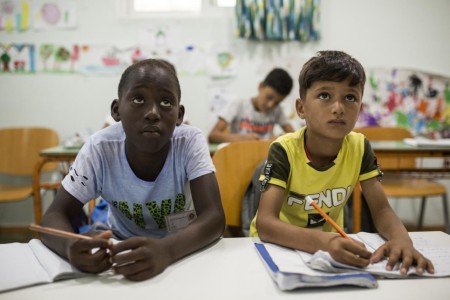BRIDGETOWN, Barbados – The UN Refugee Agency, UNHCR, has called for an international effort to guarantee secondary education for refugee children and youth, as levels of school and university enrolment remain critically low.
 Children living at the Pyli Reception and Identification Centre learn Greek at the KEDU non-formal education center on the island of Kos, Greece. © UNHCR/Socrates BaltagiannisThe call coincides with the launch of the UNHCR’s 2021 education report titled “Staying The Course: The Challenges Facing Refugee Education,” that highlights the stories of young refugees around the world as they try to keep learning in an era of unprecedented disruption caused by the coronavirus (COVID-19) pandemic.
Children living at the Pyli Reception and Identification Centre learn Greek at the KEDU non-formal education center on the island of Kos, Greece. © UNHCR/Socrates BaltagiannisThe call coincides with the launch of the UNHCR’s 2021 education report titled “Staying The Course: The Challenges Facing Refugee Education,” that highlights the stories of young refugees around the world as they try to keep learning in an era of unprecedented disruption caused by the coronavirus (COVID-19) pandemic.
It noted that secondary school should be a time of growth, development and opportunity. It increases the job prospects, health, independence and leadership of vulnerable young people, and they are less likely to be pressured into child labor.
Yet according to data gathered by UNHCR in 40 countries, the gross enrolment rate for refugees at secondary level in 2019-2020 stood at only 34 per cent. In almost every country, the rate trails that of host community children.
The UNHCR said that the pandemic is likely to have undermined refugees’ chances yet further, noting that COVID-19 has been disruptive for all children, but for young refugees – already facing significant obstacles to getting into school – it could dash all hopes of getting the education they need.
“Recent progress made in school enrolment of refugee children and youth is now under threat,” said UNHCR chief Filippo Grandi, adding “confronting this challenge requires a massive, coordinated effort, and it is a task we cannot afford to shirk”.
In the report, the UNHCR said for example, refugee and migrant children face challenges to access education in Trinidad and Tobago.
It said in the case of a Venezuelan girl, named Maria, who is an asylum-seeker in Trinidad and Tobago, non-nationals are not allowed to enroll in the public school system unless they are given permission from the relevant authorities.
“Refugee and migrant children are therefore often excluded from accessing education unless they can afford private school.”
In 2019, recognizing this critical gap, UNHCR and UNICEF, along with other local NGOs, including UNHCR partner The Living Water Community, developed Equal Place. Meant to be a temporary solution, Equal Place offers refugee and migrant children the opportunity to continue their schooling via two online platforms: NotesMaster in English and Daware in Spanish.
As of July 2021, there are about 1,400 students enrolled in the program or 32 per cent of the estimated 4,400 school-aged refugee and migrant children in Trinidad and Tobago.
“Education is a powerful tool for inclusion and integration of refugees and migrants in a new community. In particular, it provides the stability children need after the uncertainty of displacement,” said Miriam Aertker, UNHCR’s Head of National Office in Trinidad and Tobago.
“The more refugees, migrants and host communities get know each other, especially children and youth when learning, playing together and becoming friends, the more they will overcome biases, fears and misunderstandings.”
Together with its partners, UNHCR continues to advocate for universal access to education as a human right in Trinidad and Tobago, and globally.
UNHCR said it is calling on states to guarantee the right of all children, including refugees, to access primary and secondary education, and to ensure they are part of national educational systems and planning.
In addition, states hosting large numbers of displaced people need assistance in building capacity: more schools, appropriate learning materials, teacher training for specialized subjects, support and facilities for teenage girls, and investment in technology and connectivity to close the digital divide.
UNHCR said the data also shows that from March 2019 to March 2020, gross enrolment rates for refugees at primary level stood at 68 per cent.
“Enrolment in higher education was at 5 per cent, a 2-point rise year-on-year and a gain that represents transformational change for thousands of refugees and their communities. It’s an increase that also offers hope and encouragement to younger refugees facing daunting challenges to accessing an education.
“Yet this level remains low when compared to global figures, and without a major increase in access at secondary level, the 15by30 target set by UNHCR and partners – 15 per cent of refugees enrolled in higher education by 2030 – will remain out of reach. “


